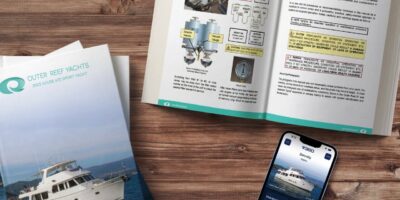Boat Maintenance Tips
Use these insights so your boat’s bits and pieces stay moving! These maintenance tips contain crucial information for every boat owner.
- January 25, 2024
Invest In Oil (Changes)
Frequent oil changes ward off breakdowns and extend the life of your engine(s) by thousands of hours. It’s as simple as that. Engine manuals typically specify changing the oil every 100*, 125*, or 150* hours. Pay attention to that asterisk! It means “but no less than once a year.” If your boating is seasonal, once a year isn’t enough. Change the oil when you commission your boat in the spring and winterize it in the fall. You’ll never get a better return on a $40 investment than from changing your oil twice a year or every 100 hours. Also check the oil on the dipstick every time you run.
— Don Casey
Grounding Troubleshooting
Odd trailer electrical failures are often caused by ground issues. Before you go crazy troubleshooting, seat the coupler onto the ball. Although it should never be the primary source for a ground (that’s your white wire!), this adds to the continuity of the ground when the trailer is coupled to the vehicle frame through the hitch.
— John Adey
Epoxy Cleanup
Cheap Tupperware-style food containers make great mixing pots for two-part epoxy, and after the job is done, the cured epoxy will pop out of the container without sticking. If your glue job involves adjacent surfaces to which you don’t want anything sticking, protect them with wax paper or a good coating of Butcher’s Wax.
— Chris Landers
Two-Part Epoxy
If you need to stick new epoxy to cured epoxy (fairing in a fiberglass patch job, for example), wash the cured epoxy with soap and water first to remove the waxy buildup (called ammine blush) the epoxy releases when it cures. Some prefer to also use a solvent recommended by the epoxy manufacturer to wipe down the cured epoxy. Apply your new epoxy after it dries. For more on which sealants to choose, see this article on boat sealants.
— Ted Sensenbrenner
Lug Nuts
With any rim, always check your lug nuts for the proper tightness. Galvanized rims need special attention. Galvanized coating is softer than the metal itself, causing lug nuts to loosen over time.
— J.A.
Spare Filters
Fuel filters play a key roll in uninterrupted boating. When you get bad fuel, and a clogged fuel filter develops, it needs to be replaced. Make sure you carry spares, know how to change them out, and do so on a regular maintenance schedule. Also regularly check the status of the filter using its pressure gauge or by looking at the bowl, if it has one. Also, mark the date and engine hours on your filter or filter housing at the time of change.
— Jim Favors
So Screwy!
Buy a multi-pack of high-grade stainless screws and nuts so you have a variety aboard. This can be the difference between a simple repair and a trip back to shore.
— Carlos Alvarez
Install A Fuel Filter
All boats should have a water-separating fuel filter installed in the line that goes from the tank to the engine. The filter canister should be replaced at least annually. The filter should be mounted in an area that’s easy to access, and care should be taken to mount it where a filter wrench could be used, if necessary, to remove the canister.
— John Tiger
Advice On Light & Electrical
Laws governing trailers — including the lights they must carry — vary from state to state, are subject to federal regulations, and are always subject to change. Know your jurisdiction and rig. The two most common ways to blow out a bulb are by immersing a hot bulb in cold water or by letting corrosion cause a short.
Some trailer lights can be removed before launching. Don’t let the connector plug to the car touch the water, and disconnect the trailer wiring harness from the 12-volt receptacle on the car just before submerging the lights. Use only tinned stranded wire, which is more flexible and chafe-resistant. Secure exposed wire every 18 inches to prevent chafing. Inspect the entire system twice a year for bare or chafed wire, and give all contacts a protective dab of grease. Don’t forget the spare bulbs and fuses. When trailer lights begin to fail, consider a total system replacement. Just cut wires at the rear end of the trailer and use old wires to pull new system wires through the trailer frame. Hook up the new light kit, and you have a brand-new system.
— The Editors
Storing Your Drive
When storing your boat ashore (or on a lift), try to keep the outboard or sterndrive in the down position so the hydraulic rams are fully retracted. This keeps the rams (or pins in the case of many outboard trim units) inside the hydraulic cylinder, protected from the elements. It also prevents water from accumulating inside the prop hub. This can present a problem when you use the tongue jack to raise the angle of the boat, as you could be pushing the skeg into the ground. Take this into account when choosing a storage location.
— John Adey
Leaf-Spring Storage
When a trailer is parked for a period of time, spray an anti-corrosion compound (such as CRC 656) on the springs to keep them from seizing.
— J.A.
Winch-Strap Vacation
Loosen the winch strap and tie-down straps on the trailer to relieve the tension on the trailer frame, the boat, and the straps over the course of the winter. However, leave them tight enough to hold down the boat in high winds.
— John Tiger
Remove Your Trailer Hitch Ball Mount When Not Intending To Tow
Many states have laws requiring the bumper to be the first area of impact on your vehicle. Leaving your ball mount installed violates this law as it protrudes beyond the bumper. Many states specifically require that a ball mount be removed when the vehicle isn’t towing. Removing the ball mount keeps it from rusting in place. It also keeps you from banging your shins on it when going around the back of the truck.
— J.A.
What Goes Wrong Out There?
Trailers aren’t complicated, computer-driven machines, and 99 percent of what can go wrong, you can fix yourself. Here are typical problems:
- Breaks in the wiring harness due to coated wires rubbing against the trailer frame causes fuses to blow, and lights to go out.
- Bulbs go out in your trailer’s lighting system.
- Axle bearings overheat or simply disintegrate and bind.
- Tires go flat.
- Tow chains come loose.
- Something not tied down on the boat winds up on the highway.
- Your trailer load is out of balance and winds up fishtailing.
- Your brakes don’t work due to neglect.
- A hydraulic leak in the braking system causes the brakes to fail. Check hydraulic and electric brakes regularly.
- Trailer bolts loosen. Fenders and add-ons must be checked each time before departure. Everything vibrates on the road. No bolt or nut remains unaffected. minimized!
— J.A.
BoatUS Editors
Contributor, BoatUS Magazine
About Vessel Vanguard
Vessel Vanguard is a leading marine safety and maintenance management software provider dedicated to revolutionizing the maritime industry. With a commitment to innovation and excellence, Vessel Vanguard delivers cutting-edge solutions to streamline operations and enhance vessel performance and safety.
Latest Industry Insights

Embracing E-Boating Efficiencies

Boat Fuel Systems

The Future of Boats & Boating

Yacht Navigation Light Inspection
View All of Our Industry Insights
Navigate maritime with the latest news, practical how-to guides, insightful analyses and more.
